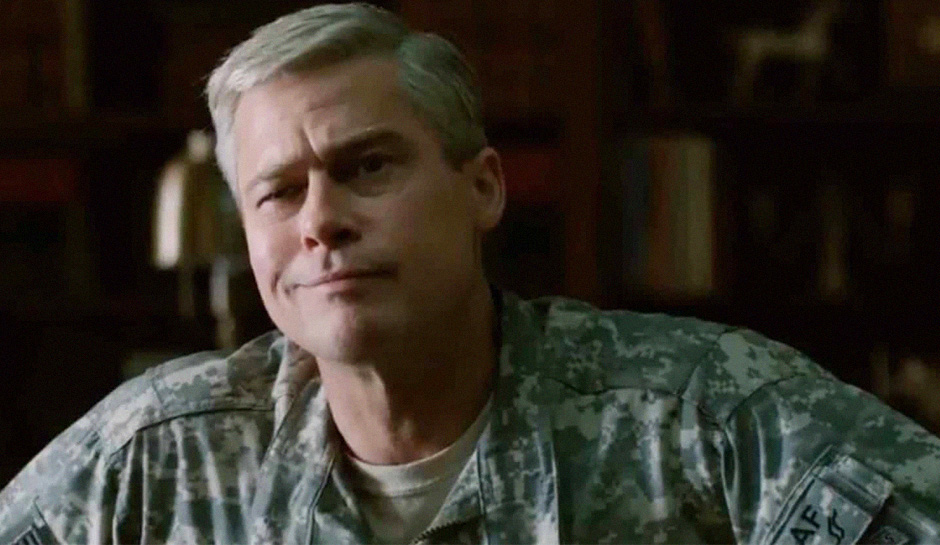War Machine (2017)

When was the last time Brad Pitt (By the Sea, Fury) gave a performance that didn’t resemble an alien trying to control a human host?
That’s the question I posed on Twitter shortly after screening War Machine on Netflix, where it debuted, as Pitt labors to look remotely credible as a seasoned, grizzled general controlling the forces in Afghanistan in 2009, at a time when things aren’t so great for the US military presence (technically NATO), as well as the PR campaign. He sure gives it a try, with idiosyncratic mannerisms, a gravely voice, lets his hair go gray, and lots of alteration of his physical stature and gait, but the further he removes himself from his own natural bent, the further he also moves away from the kind of person we could ever envision playing the lynchpin role in such a heady satire.
Not that this leading man hasn’t been able to deliver character performances in films before, such as very good ones in such films as 12 Monkeys, Snatch, True Romance, and Kalifornia, but those films exploited his penchant for being slightly off-kilter in his demeanor and mannerisms. War Machine asks us to believe that he’d be the kind of man that a president would entrust to lead and inspire the ground troops, and to win over the Afghani people despite constant strikes, in a major controversial theater of battle. This also makes him the main focus of the media, and just two minutes with Pitt’s General Glen McMahon (the name of Gen. Stanley McChrystal changed for the film) would have anyone questioning why on Earth the guy is a general, much less given the one of the highest profile positions in the military in a time when the war in Afghanistan is at its most unpopular at home.
Alas, it’s a major reason why War Machine never gets off of the ground as a satire, taking its story, quite loosely, from the Michael Hastings book, “The Operators”. Utilizing narration from Scoot McNairy (Batman v Superman), who shows up a good way into the film as Sean Cullen, a journalist working for Rolling Stone magazine (a fictional stand-in Michael Hastings), mostly to keep the story together, though, to a large degree, it is rather an unnecessary device given the scope stays fairly simple, sticking mostly with McMahon’s interactions with his lackeys and advisors (a veritable who’s who of stars from 1980s films, like Anthony Michael Hall (Foxcatcher), Meg Tilly (Agnes of God), Griffin Dunne (Dallas Buyers Club), and Alan Ruck (Ghost Town)). We watch him get annoyed, primarily at President Obama for not only mentioning that they plan to pull out within 18 months, which McMahon feels will demoralize his troops into believing they can’t win, but also wants to do what they say can’t, or shouldn’t, be done, in capturing Taliban strongholds that don’t really give them any military advantage to secure.
Of course, we all know that the war would not end in 2010, as it still rages on to the time of this writing, sixteen years and running, and shows no signs of ceasing any time soon. Perhaps the reasons why that is would be more interesting to delve into than the subject matter of McMahon’s beginnings, but that’s not the film we have here from Australian writer-director David Michod (The Rover, Animal Kingdom). The writing and direction from Michod are fine from a technical standpoint, but the tone is uneven and the film never generates the tension necessary to make for a good wartime yarn. As such, it’s an experience that offers a few interesting, amusing, pithy, or poignant scenes, but not enough of them flow together to make the otherwise dull and goofy War Machine a satisfying whole for those looking for the next great absurdist war parody.
Qwipster’s rating: C
MPAA Rated: Not rated, but would likely be R for violence and language
Running Time: 121 min.
Cast: Brad Pitt, Anthony Michael Hall, Alan Ruck, Scoot McNairy, Topher Grace, John Magaro, Lakeith Stansfield, Anthony Hayes, Meg Tilly, Emory Cohen, Ben Kingsley, Daniel Betts, Griffin Dunne, Aymen Hamdouchi, Will Poulter, Nicholas Jones
Small role: Tilda Swinton, Russell Crowe
Director: David Michod
Screenplay: David Michod (based on the book, “The Operators” by Michael Hastings)
